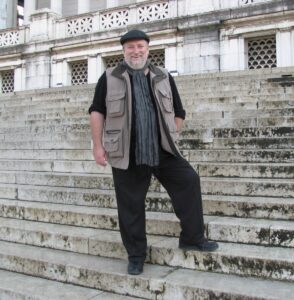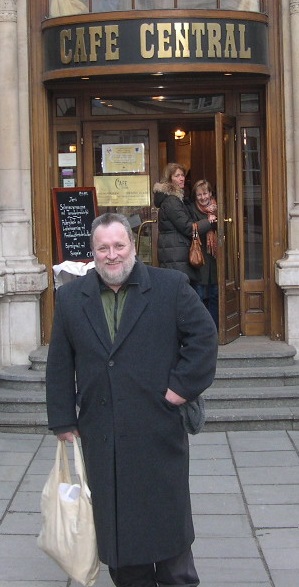From Loyal Reader Wyseguy in Comments to last week’s post on the topic:
So our gracious host made a distinction I found rather interesting that I’d like him to expand up on if possible. I recently started working for a travel company and we get some interesting international travel benefits as part of our compensation package so international travel is likely in my future.
What do you define as the difference between being a tourist and being a traveler? More importantly, how does one actually be a traveler rather than a tourist?
I’ve alluded to this often, but perhaps it’s time I gave it the full treatment.
Tourists often travel in groups and only go to the “recommended” places (e.g. the Louvre in Paris, Madame Tussaud’s in London, Sistine Chapel in Rome, and so on).
They will not be adventurous at all, whether exploring off-the-beaten-track places or trying the local cuisine — especially if it’s quite different to what they get at home. (Eating spaghetti or pizza in Naples is pretty much the same as eating it in New York or Des Moines, for example.)
They’ll go to England, visit London and maybe Bath — but in Bath, they’ll visit the Roman baths museum and not eat at the Pump Room, for instance, or try any of the delicious local pies.
British tourists will go to Spain or the Algarve and complain when they can’t find Egg & Chips on the menu. Ditto Americans who will eat at the local Burger King, don’t get me started.
Tourists will always try to convert the local currency to their own before making a purchase, just to make sure they’re not getting ripped off. If you start with the premise that everywhere is more expensive than the U.S. (except in the Third World), you’ll be a lot more relaxed about it.
Lastly, tourists will wear the same clothes overseas as they do at home, rather than trying to blend into the place they’re visiting. Americans are absolutely the worst in this regard.
All tourists — American, German, British, Japanese or African, whatever — are loud and awful, and a good indicator of where not to go is if the place is full of them. A bar full of drunken Brits singing football songs in any country except the U.K. will get me out of there quickly.
Now for the good stuff.
Travelers want to visit foreign places and take in the way of life there, whether the architecture, the customs, the food and drink, how people dress (and will dress as close to the locals as possible), and how the locals live, in general. (When I was in London once, I was asked by some Brit friends whether I’d want to have dinner at some “Texas BBQ” restaurant. Feel free to imagine my response.)
Yes, they will go to the “sights”, but generally out of season (when the locals go), but will shun long lines and queues regardless.
In fact, “out of season” is generally the best time to travel (unless the weather means that everything’s closed, e.g. New England or the French Riviera in January). And bad weather is not necessarily a deterrent, by the way — it was only when I experienced London in January, for example, that I appreciated why the locals flee Britishland for warmer climes.
Travelers can be found in restaurants where they are the only patrons not speaking the local language. And speaking of languages: travelers will make an attempt to speak the local lingo rather than insisting on everyone speaking English, even if just a few sentences learned prior to the trip. And they’ll speak quietly, the same as the locals do, and not bray in loud tones so that everyone can hear their opinions or stories.
Oh, and you’ll never find travelers standing in the street with a phone, guidebook or map in hand, trying to figure out where they are; they’ll step inside a shop or pub first before looking, but most of the time they’ll have figured out where to go before leaving the hotel, gasthaus or b&b.
As for clothing: you’ll want to be mistaken for a local and not a tourist — this as much for safety as good travel etiquette. If you can, take the bare minimum of clothing with you, and buy local stuff on Day 2. (Pro tip: in western Europe, H&M is the place to go for inexpensive clothing — their merchandise is completely different from U.S. H&M — and of course Marks & Spencer in Britishland — Primark for less expensive stuff). Oh, and work out the sizing nomenclature before you go — keep a cheat sheet on hand if necessary. As a rule of thumb: most Euro clothing is sized smaller than their U.S. counterparts, so beware. Generally speaking, I decide on a color palette (navy blue/black or dark brown/dark green) before I go, and then buy accordingly.
Finally: wear good walking shoes, and not sneakers / trainers. The Euros understand this because they walk all over the place. (I’ve found Mephisto Arthis or Davy walking shoes to be the best option — I have a black and brown pair of Arthis — but YMMV.)
I hope this helps, and gives everyone at least a direction in which to go if you want to visit foreign lands and appreciate / enjoy them.
In order: Rome, Vienna, Bath and Edinburgh (eating parrutch):





While good advice, I never could blend in in Japan
Nobody can. Imagine my #2 Son in Tokyo, at 6’5″ tall with a blaze of red curly hair and the pale coloring associated with that…
Heh, or Korea.
While stationed in there my ROK Army Captain counterpart took me on a locals tour of Seoul. Most places I was the only westerner there. I just concentrated on keeping my voice down, trying to remember local protocol, and butchering the few phrase of Korean I could pronounce (I suck at tonal languages, hearing or speaking)
Walking to his parents house I really felt like I stuck out (6ft1 blondish hair and very easily sunburned skin) . I’d hated to have to escape and evade there, as I’m sure every schoolkid in the playground we passed could have told the local cops exactly which way I went and what house I went into.
I always love these articles about how uncouth American tourists (“travelers”, now, apparently) behave and dress in Europe.
So I’m now supposed to wear the “proper” shoes, linked to ads for $300 shoes that look no different from my $50 New Balance except they are not white.
Sorry, Euros — deal with my NB’s. I like them.
$300 is not excessive for a pair of shoes that will last you well over two decades, as my Mephistos have me.
Thank you!
Yes, I definitely would prefer to be a traveler rather than a tourist. Nothing wrong with seeing the sights, but I’d rather spend an evening in a British pub struggling to learn the lyrics to whatever football song they’re drunkenly singing than spending half the day waiting in line in some art gallery. That, to me is why I would want to visit far off places. Not to see the things everyone else goes to see, but to live as the locals live. Do what the locals do. Eat what the locals eat. Try my level best to speak as they speak, at least enough to show the locals I respect them enough to put in the effort.
Hadn’t considered the clothing part and that seems like very good advice to me. At 6’7″ that might be more difficult to head out to the store in country and buy a sufficient amount of clothing to blend in and not double the price of the trip, but I suspect a few photos of the kind of clothes worn by locals would allow me to shop closer to home prior to the trip.
My wife and I do both. We’ll see some popular sites but we prefer to find the local stuff. In Ireland there were some ugly Americans near us that were loud and obnoxious. It was very embarrassing. A folk singer had come from Scotland and was going to sing either a capella or with a light accompaniment and the Uglies WOULD. NOT. SHUT. THE. FUCK. UP. Several people had to tell this one broad to shut up including the barman.
The first trip my wife and I took to EUrope, we got off a bus or tramway of some sort and cut through a mall. I told her to check prices on things. She was puzzled. When we came out I explained that the local cost of the clothes we had one would have a bearing on how we were perceived by the locals. Being Americans, we both probably had on jeans which were several times the cost of what we paid for them in America. I knew of people from Ireland who had relatives and friends come over with empty suitcases, fill up on American clothing because it was cheaper than what they could get in Ireland or England. I’m sure it was a steal when adding on 15% VAT to items.
I usually wear hiking shoes. They used to be LL Bean but are now Vasque low boots. I’ve never been a fan of sneakers.
JQ
How can you go to a foreign place and not try the local cuisine? Sure I’d like some pizza in Italy to compare to what I can here, but you can be damn sure I’m trying as much local food as I can. That’s half the point in going there in the first place. The other half is seeing the sites that I cannot see at home.
JQ
Fair comment by and large but I would take issue with one thing :
“Eating spaghetti or pizza in Naples is pretty much the same as eating it in New York or Des Moines, for example”
It fucking isn’t! the probability of being able to eat decent spaghetti or pasta in New York (never been to des moines) is close to zero, pizza is even more difficult than pasta, hell even Italians travel to Naples to savour the pizza there.
But otherwise, right on the money.
For some reason the “tourist” section reminded me of some silly complaints I’d seen in an article some years back. Such as:
1. “It took us nine hours to fly home from Jamaica to England. It took the Americans only three hours to get home. This seems unfair.”
2. “We had to line up outside to catch the boat and there was no air-conditioning.”
3. “My fiance and I booked a twin-bedded room but we were placed in a double-bedded room. We now hold you responsible for the fact that I find myself pregnant. This would not have happened if you had put us in the room that we booked.”
4. “It’s lazy of the local shopkeepers in Puerto Vallarta to close in the afternoons. I often needed to buy things during ‘siesta’ time – this should be banned.”
5. “No one told us there would be fish in the water. The children were scared.”
6. “We booked an excursion to a water park but no one told us we had to bring our own swimsuits and towels. We assumed it would be included in the price.”
7. “Although the brochure said that there was a fully-equipped kitchen, there was no egg-slicer in the drawers.”
8. “The roads were uneven and bumpy, so we could not read the local guide book during the bus ride to the resort. Because of this, we were unaware of many things that would have made our holiday more fun.”
9. “There were too many Spanish people there. The receptionist spoke Spanish, the food was Spanish. No one told us that there would be so many foreigners.”
10. “I was bitten by a mosquito. The brochure did not mention mosquitoes.”
11. “We found the sand was not like the sand in the brochure. Your brochure shows the sand as white but it was more yellow.”
12. “One traveller asked to move rooms as he insisted there was a strange buzzing coming from the airconditioner. After moving rooms, the noise was discovered to be an electric toothbrush in his suitcase.”
13. “I’m sure I’ve stayed in this hotel room in a previous life. I cannot stay here again.”
14. “Why are there no kangaroos hopping around Sydney city? I’m most disappointed.”
15. “It is your duty as a tour operator to advise us of noisy or unruly guests before we travel.”
16. “They should not allow topless sunbathing on the beach. It was very distracting for my husband who just wanted to relax.”
17. “On my holiday to Goa in India, I was disgusted to find that almost every restaurant served curry. I don’t like spicy food.”
18. “I think it should be explained in the brochure that the local convenience store does not sell proper biscuits like custard creams or ginger nuts.”
I’ve heard worse. In situ, even.
If a tourist isn’t complaining, there’s the possibility that he/she/it is dead.
Two years ago, I used insurance money(*) to go to Scotland. I was asked often what kind of tours I was doing in Glasgow: the only active tour I took was a one-day to Loch Ness, etc., and that was because I wasn’t driving. It floored people I wasn’t on an active tour. Last year’s trip (yes, I now have an addiction…) included a 7 day tour, but again because I wanted to explore without driving and I need to go once to know where I’m going. Next time to Mull and Iona, I’m trusting the trains, busses, and taxis.
My personal traveller list: Don’t be afraid of name-brand hostels (but ask for the bottom bunk in advance). If you need walking directions often, invest in a smart watch and a small earbud. No one gives a second thought if you check your watch a lot to read the directions, or listen to Siri in your left ear. I blend in with Doc Martens myself, but good shoes and plenty of socks are essential. Bring a debit card or a credit card with an ATM pin. You won’t need cash until you absolutely do. (I had to send myself Western Union on trip 2 because I forgot my debit card.) And don’t forget change for the public toilets.
Never be afraid to ask for help. Never turn down unsolicited help. Most people are absurdly helpful and kind. And the next time you see a big burly guy with expensive walking shoes looking about and a seeming little lost, offer him help, he might be worth knowing.
In May we were in Paris, jet-lagged senseless, standing in front of a concrete condo building done in the French inscrutable and brutal style which was supposedly the location of our airbnb. We had no idea if it was the right building because it had neither name nor street number on it and a number of dark holes, doorways and archways which may or may not have been entrances. A nice elderly lady, probably 5 years my junior, came over to offer help because, as she said, we looked “confused and lost”. She led us into a dark archway, through a scummy looking hallway, around a corner to a graffiti fouled elevator door.
Which took us to the 22nd floor and a nice, clean, roomy flat with a gorgeous panorama view of the Eiffel tower on the left and Montmartre on the right.
Excellent writing, and why I’ve lived your blogs all these many years. The comments are almost as good.
Wife and I are definitely more travelers than tourists, however I will admit to LOVING our Viking med cruise from Athens to Venice with all the touristy stuff, too. I prefer traveling, though.
No no never wear trainers they are designed for maximum comfort maximum support and minimum injuries. Especially if you are visiting Britain wear the heaviest stiffest most uncomfortable footwear you can find with bonus points if you inherited them from a grandparent. To be serious (which I never am) the one thing upon which I insist is in cool weather, warm dry shoes.